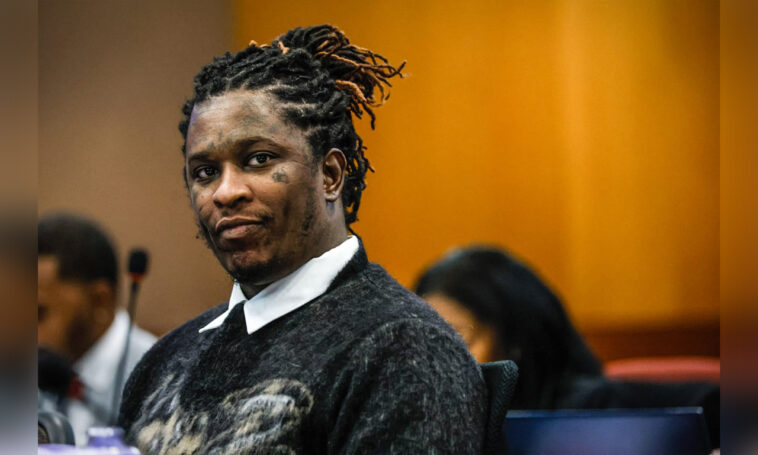In Atlanta’s high-profile gang trial involving rapper Young Thug, the possibility of a mistrial now hangs over proceedings, which could force prosecutors to either restart the case or abandon it after over two years in court. This motion for mistrial was prompted by an incident on Wednesday, October 23, when a prosecution witness inadvertently disclosed restricted information to the jury. Defense attorneys argue this was due to prosecutorial errors, while Judge Paige Reese Whitaker criticized the government’s attorneys for “sloppiness” in handling the case.
The potential mistrial threatens to end one of Georgia’s longest-running trials, which has now endured a prolonged process of jury selection and testimony spanning nearly two years. With over ten months dedicated to jury selection and 11 months of testimony, this trial has seen a parade of witnesses and unusual delays, including a jailhouse incident where one defendant was stabbed and the removal of a previous judge after a secret meeting. Judge Whitaker, who assumed responsibility for the case in the summer, has voiced increasing concerns about the Fulton County District Attorney’s office, previously describing the case management as “poor” and “haphazard.”
During Wednesday’s hearing, Judge Whitaker declined to grant a mistrial with prejudice, which would have barred the case from being retried. However, she is considering a mistrial without prejudice, which would allow prosecutors to start anew with a fresh jury. News of a possible mistrial has led prosecutors to explore plea deals with the defense teams. Cathy Russon, managing editor at Law&Crime, reported on X that each defense team planned to meet with District Attorney Fani Willis on Thursday to discuss possible resolutions. Trial proceedings on October 24 and 25 have been postponed as a result of these discussions and the potential mistrial motion, with the trial scheduled to resume on Monday, October 28.
The case dates back to May 2022, when Young Thug, born Jeffery Williams, and numerous associates were indicted under Georgia’s Racketeer Influenced and Corrupt Organizations (RICO) Act. Prosecutors allege that his “Young Stoner Life” (YSL) label was actually a front for “Young Slime Life,” a violent gang involved in crimes like murder, carjacking, armed robbery, and drug trafficking. Thug, credited with helping shape modern hip-hop, has been held without bond for over two years, with judges concerned he might influence witnesses if released. If a mistrial is granted and the case is retried, Thug could remain in jail for several more years, which may prompt defendants to consider plea deals to expedite the process.
The mishap triggering calls for a mistrial occurred during testimony from Wunnie Lee, also known as Slimelife Shawty, a former YSL defendant who accepted a plea deal in exchange for his testimony. While on the stand, prosecutors showed Lee social media posts to help identify certain defendants. However, when reading aloud one of the posts, Lee mentioned #freequa, a hashtag referencing Marquavius Huey, known as Qua, one of Thug’s co-defendants with a prior prison record. This slip was significant, as the jury was not supposed to know about any defendant’s prior incarceration. Defense attorneys argued that prosecutors should have redacted the post and prepared Lee to avoid mentioning it. Following the mistake, defense attorneys immediately requested a mistrial.
Defense attorney Nicole Westmoreland strongly condemned the oversight, stating, “We’re not going to be able to unring this bell. It is painfully obvious that the state is not prepping their witnesses.” Judge Whitaker, visibly frustrated, tried to find a solution to keep the trial on track, remarking, “What I’m trying to do is fix your sloppiness so that everybody won’t have wasted 10 to 12 months of their lives in this trial.”
The potential mistrial has sparked public interest as well as frustration from those following the case. If a mistrial is declared, it could also prompt additional scrutiny of the prosecution’s handling of the trial, as Judge Whitaker has repeatedly highlighted the disorganized nature of their case strategy. The Fulton County DA’s office, facing mounting pressure to bring an end to the lengthy legal saga, will have to weigh its options carefully in the days to come.
Young Thug’s trial has underscored the complexities of Georgia’s RICO law, which aims to dismantle organized crime but requires extensive evidence to prove. The trial has put intense scrutiny on the YSL organization, with the prosecution alleging it engaged in coordinated criminal activities for over a decade. For Thug, this case carries immense personal and professional stakes, as a mistrial could mean prolonged detention and additional legal battles. This may also explain the recent plea discussions between prosecutors and defense teams, as a negotiated resolution could expedite matters for both sides.
As the legal proceedings pause for plea discussions and the mistrial motion, all eyes remain on Atlanta’s judicial system and the ultimate fate of one of the city’s most high-profile trials. Judge Whitaker’s decision will significantly impact Young Thug, the other defendants, and the overall trajectory of gang-related prosecutions in Georgia, setting a precedent on the efficacy and length of such high-profile RICO cases.



